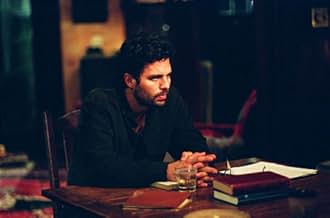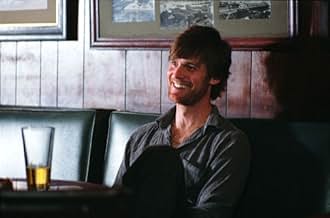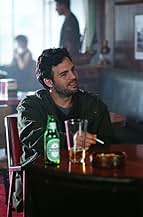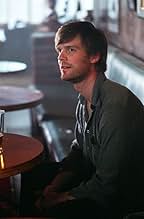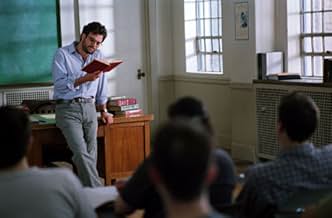IMDb रेटिंग
6.2/10
10 हज़ार
आपकी रेटिंग
अपनी भाषा में प्लॉट जोड़ेंAn indiscretion between two close friends tears down their respective marriages.An indiscretion between two close friends tears down their respective marriages.An indiscretion between two close friends tears down their respective marriages.
- पुरस्कार
- 2 जीत और कुल 4 नामांकन
फ़ीचर्ड समीक्षाएं
Watch this as a double-bill with Mike Nichols' "Closer," and you very well might swear off love, relationships and marriage for a very long time, if not forever.
The last screenwriter I'd expect to write a somber, almost Bergmanesque exploration of marriage and infidelity would be Larry Gross, whose credits include "48 HRS." (1982) and "Streets of Fire" 1984) for Walter Hill and "True Crime" (1999) for Clint Eastwood.
Yet Gross has turned two Andre Dubus short stories into an engaging, albeit somewhat depressing, movie that explores marital infidelities among two couples - Jack (Mark Ruffalo) and Terry Linden (Laura Dern); and Hank (Peter Krause) and Edith Evans (Naomi Watts).
Much like the Nichols film, "We Don't Live Here Anymore" can be tough viewing, at times. Uncomfortable, even occasionally painful. But the actors make it work, often lifting it above trite moments. Director John Curran keeps things tight and gets emotionally powerful performances from them. Though, the film would have smarted more had Krause injected some rawness into his role. Hank seems too laid-back about the whole affair and Krause's performance never inches past insouciant.
Dern throws herself fully into her strongest role since "Citizen Ruth" (1996). As a wife who's apparently lost the desire of her husband and really has little interest in housework, Dern does well to keep Terry from turning into a broad caricature. She makes Terry sad without turning her pathetic. A bedroom confrontation with Jack doesn't veer into clichés only because Dern and Ruffalo bring such brutal honesty to their roles.
Watts seems to revel in playing emotionally devastated women. Here, she throws in selfishness, to boot. Watts makes it awfully difficult for us to like Edith because she's the most manipulative of the lot. That we wind up caring about her speaks highly of Watts' acting ability.
The Lindens and the Evanses might very well take narcissism to a new level. These thoroughly self-absorbed people don't really care about the infidelity. In fact, they're so blasé about it all, you wonder if anything at all would jolt them into feeling something for someone else.
When Edith asks Jack, "How do you think we'll get caught?" she's not so much worried about her husband finding about the affair than her friend, Terry. And it's in delving into the Terry-Edith dynamic that Gross' script fails. We hear that these two women are dearest friends. Yet, we never get that feeling from watching them together. In fact, Gross never really gives either Dern or Watts, two incredible talents, the chance to play off each other. Their few scenes together barely scratch the surface of any friendship Terry and Edith might have.
True, there's nothing really sympathetic about any of these four people. I doubt redemption's around the corner, either. But the way they claw at each other's emotions, occasionally fraying themselves, as they lie and cheat, and even tell the truth, to their loved ones, makes for compelling viewing.
"We Don't Live Here Anymore" shows a side of marriage that movies, certainly American movies, rarely dare to depict. Marriage isn't easy. For many, it can be terribly hard work. Sometimes, painful and difficult work. And that's what this film shows.
You can't really say you enjoyed watching this movie, but it will linger with you long after you're done watching it; when you're stuck washing dirty dishes for the umpteenth time, picking up tossed-about laundry or suddenly realizing that your lover's quirk which you once thought was endearing and cute is now just positively irritating and infuriating.
The last screenwriter I'd expect to write a somber, almost Bergmanesque exploration of marriage and infidelity would be Larry Gross, whose credits include "48 HRS." (1982) and "Streets of Fire" 1984) for Walter Hill and "True Crime" (1999) for Clint Eastwood.
Yet Gross has turned two Andre Dubus short stories into an engaging, albeit somewhat depressing, movie that explores marital infidelities among two couples - Jack (Mark Ruffalo) and Terry Linden (Laura Dern); and Hank (Peter Krause) and Edith Evans (Naomi Watts).
Much like the Nichols film, "We Don't Live Here Anymore" can be tough viewing, at times. Uncomfortable, even occasionally painful. But the actors make it work, often lifting it above trite moments. Director John Curran keeps things tight and gets emotionally powerful performances from them. Though, the film would have smarted more had Krause injected some rawness into his role. Hank seems too laid-back about the whole affair and Krause's performance never inches past insouciant.
Dern throws herself fully into her strongest role since "Citizen Ruth" (1996). As a wife who's apparently lost the desire of her husband and really has little interest in housework, Dern does well to keep Terry from turning into a broad caricature. She makes Terry sad without turning her pathetic. A bedroom confrontation with Jack doesn't veer into clichés only because Dern and Ruffalo bring such brutal honesty to their roles.
Watts seems to revel in playing emotionally devastated women. Here, she throws in selfishness, to boot. Watts makes it awfully difficult for us to like Edith because she's the most manipulative of the lot. That we wind up caring about her speaks highly of Watts' acting ability.
The Lindens and the Evanses might very well take narcissism to a new level. These thoroughly self-absorbed people don't really care about the infidelity. In fact, they're so blasé about it all, you wonder if anything at all would jolt them into feeling something for someone else.
When Edith asks Jack, "How do you think we'll get caught?" she's not so much worried about her husband finding about the affair than her friend, Terry. And it's in delving into the Terry-Edith dynamic that Gross' script fails. We hear that these two women are dearest friends. Yet, we never get that feeling from watching them together. In fact, Gross never really gives either Dern or Watts, two incredible talents, the chance to play off each other. Their few scenes together barely scratch the surface of any friendship Terry and Edith might have.
True, there's nothing really sympathetic about any of these four people. I doubt redemption's around the corner, either. But the way they claw at each other's emotions, occasionally fraying themselves, as they lie and cheat, and even tell the truth, to their loved ones, makes for compelling viewing.
"We Don't Live Here Anymore" shows a side of marriage that movies, certainly American movies, rarely dare to depict. Marriage isn't easy. For many, it can be terribly hard work. Sometimes, painful and difficult work. And that's what this film shows.
You can't really say you enjoyed watching this movie, but it will linger with you long after you're done watching it; when you're stuck washing dirty dishes for the umpteenth time, picking up tossed-about laundry or suddenly realizing that your lover's quirk which you once thought was endearing and cute is now just positively irritating and infuriating.
An ernest dose of claustrophobia
We Don't Live Here Anymore begins with two couples having a semi drunken party. At least Terry (Laura Dern), Jack's wife, is getting drunk, a thing she does pretty often. They've run out of beer and Jack (Mark Ruffalo) and Edith (Naomi Watts), who's the wife of Hank (Peter Krause) go to get some. Later that night the first fight occurs between Jack and Terry. This isn't the first time Jack has run off with Edith on little improvised errands and they've come to make Terry suspicious -- and she's right: Edith and Jack are soon getting it on outside on a blanket. The two couples' lives are intertwined. Jack and Hank work in the same college English department, Jack teaching literature and Hank creative writing, an activity at which he is not a success, though acceptance of one of his poems by The New Yorker is one of the few positive and non-adulterous events in the movie. The two men also go out on runs together -- sweaty, huffy, ridiculously competitive and un-fun slogs on deserted roads, followed by a beer at a pub. Edith and Jack continue to sneak off to have sex, Terry remains suspicious, and Hank doesn't seem to care either about Edith or about anybody but himself and his unsuccess, though being a habitual philanderer often on the prowl (mostly for girl students), he eventually he scares up some lust for Terry, who's eager for that kind of revenge once she knows what Jack is up to.
There's no question about the fact that Ruffalo, Watts, Dern, and Krause do their best to flesh out what, by the film's end, still appear to be rather undefined roles underwritten and equally unsimpatico. There's no doubt about Terry's volatility and anger and Edith's cool withdrawal and intense need. Hank is laid back and self absorbed, and in one of his typically complex portrayals of a ne'er-do-well, Mark Ruffalo as Jack combines needy, querulous, hostile, and sexy with a resultingly vivid but unappealing effect -- which one could also say for Laura Dern's energetic and committed portrayal. The actors do interesting (if somewhat unrewarding) work; they're better than the material. So are the designer, who's composed wonderful interiors, and the cinematographer, who has made them translucent and real. But this is a drama so focused on adultery that the adultery itself remains incompletely described as an experience. Where's the guilt? Where's the excitement? We Don't Live Here Anymore has too little to say about anything else in life other than the mechanisms of infidelity including the way children get caught in the crossfire. Though there is plenty of drinking and some smoking (Edith and Jack indulge in the latter secret vice after their secret sex sessions), the characters don't even seem to have time to sit down and eat and there's only the most smarmy and limited depiction of the men at work in the classroom, or their offices. For men and women of intelligence, these people show little brains and wit.
The friend I saw this movie with dwelt on the retro nature of the women's roles. This is a serious flaw because there's been no effort to show that the story material is from the Seventies. It's unlikely, perhaps nearly impossible, for two assistant professors at a college in the northwest nowadays to both have wives who do nothing but cook, clean house, and mind the kids. This is just one indication of a certain clumsiness in the story adaptations that are also slim on motivation and personality. We Don't Live Here Anymore is only a `good' movie in the sense that it's a grownup treatment of a grownup theme with a certain polish and a talented cast. But it's extremely claustrophobic without the compensation one might find in Bergman, say, of a growing intensity, of leaving one with powerful emotions. Jack and Terry and Hank and Edith may sputter and lash at one another at times, but they don't seem to know about or care about themselves or each other enough to make the viewer care too.
It's hard to describe the action, which slides from scene to scene gratuitously slipping in a shot or two from another scene, such as Jack and Edith's first sex outdoors, or cutting back and forth from one couple and house to the other. Do we have to have that? Why not do one thing at a time? This is where I love the French linear clarity of Eric Rohmer. He takes one conversation at a time. No slippery flash cut peeks at other people during a conversation. Sure, Eric Rohmer's cinema is a highly formalized version of life. But what is We Don't Live Here Anymore? All these things are artificial. There are no climaxes, and there's neither passion nor brilliance. One can't help thinking of the excitement, both emotional and intellectual, aroused by a good production of Who's Afraid of Virginia Wolf, beside which We Don't Live Here Anymore almost seems to slink away in shame. And compared to the lighthearted stimulation of watching an Eric Rohmer film, this one is more like taking a dose of castor oil.
We Don't Live Here Anymore begins with two couples having a semi drunken party. At least Terry (Laura Dern), Jack's wife, is getting drunk, a thing she does pretty often. They've run out of beer and Jack (Mark Ruffalo) and Edith (Naomi Watts), who's the wife of Hank (Peter Krause) go to get some. Later that night the first fight occurs between Jack and Terry. This isn't the first time Jack has run off with Edith on little improvised errands and they've come to make Terry suspicious -- and she's right: Edith and Jack are soon getting it on outside on a blanket. The two couples' lives are intertwined. Jack and Hank work in the same college English department, Jack teaching literature and Hank creative writing, an activity at which he is not a success, though acceptance of one of his poems by The New Yorker is one of the few positive and non-adulterous events in the movie. The two men also go out on runs together -- sweaty, huffy, ridiculously competitive and un-fun slogs on deserted roads, followed by a beer at a pub. Edith and Jack continue to sneak off to have sex, Terry remains suspicious, and Hank doesn't seem to care either about Edith or about anybody but himself and his unsuccess, though being a habitual philanderer often on the prowl (mostly for girl students), he eventually he scares up some lust for Terry, who's eager for that kind of revenge once she knows what Jack is up to.
There's no question about the fact that Ruffalo, Watts, Dern, and Krause do their best to flesh out what, by the film's end, still appear to be rather undefined roles underwritten and equally unsimpatico. There's no doubt about Terry's volatility and anger and Edith's cool withdrawal and intense need. Hank is laid back and self absorbed, and in one of his typically complex portrayals of a ne'er-do-well, Mark Ruffalo as Jack combines needy, querulous, hostile, and sexy with a resultingly vivid but unappealing effect -- which one could also say for Laura Dern's energetic and committed portrayal. The actors do interesting (if somewhat unrewarding) work; they're better than the material. So are the designer, who's composed wonderful interiors, and the cinematographer, who has made them translucent and real. But this is a drama so focused on adultery that the adultery itself remains incompletely described as an experience. Where's the guilt? Where's the excitement? We Don't Live Here Anymore has too little to say about anything else in life other than the mechanisms of infidelity including the way children get caught in the crossfire. Though there is plenty of drinking and some smoking (Edith and Jack indulge in the latter secret vice after their secret sex sessions), the characters don't even seem to have time to sit down and eat and there's only the most smarmy and limited depiction of the men at work in the classroom, or their offices. For men and women of intelligence, these people show little brains and wit.
The friend I saw this movie with dwelt on the retro nature of the women's roles. This is a serious flaw because there's been no effort to show that the story material is from the Seventies. It's unlikely, perhaps nearly impossible, for two assistant professors at a college in the northwest nowadays to both have wives who do nothing but cook, clean house, and mind the kids. This is just one indication of a certain clumsiness in the story adaptations that are also slim on motivation and personality. We Don't Live Here Anymore is only a `good' movie in the sense that it's a grownup treatment of a grownup theme with a certain polish and a talented cast. But it's extremely claustrophobic without the compensation one might find in Bergman, say, of a growing intensity, of leaving one with powerful emotions. Jack and Terry and Hank and Edith may sputter and lash at one another at times, but they don't seem to know about or care about themselves or each other enough to make the viewer care too.
It's hard to describe the action, which slides from scene to scene gratuitously slipping in a shot or two from another scene, such as Jack and Edith's first sex outdoors, or cutting back and forth from one couple and house to the other. Do we have to have that? Why not do one thing at a time? This is where I love the French linear clarity of Eric Rohmer. He takes one conversation at a time. No slippery flash cut peeks at other people during a conversation. Sure, Eric Rohmer's cinema is a highly formalized version of life. But what is We Don't Live Here Anymore? All these things are artificial. There are no climaxes, and there's neither passion nor brilliance. One can't help thinking of the excitement, both emotional and intellectual, aroused by a good production of Who's Afraid of Virginia Wolf, beside which We Don't Live Here Anymore almost seems to slink away in shame. And compared to the lighthearted stimulation of watching an Eric Rohmer film, this one is more like taking a dose of castor oil.
Not a heart-wrenching film but illuminates with precision the dynamics of friendship, marriage and adultery. It shows a potent portrait of two couples whose marriages are going to break; has an enormous power and tells some uncomfortable truths. In this movie actions have consequences that are not resolved with a hug or a cry. The four grown-ups (as well as their children who are perfectly aware of the situation) are very talented and all deliver passionate and compulsive performances. The atmosphere lingering in the air is what impressed me the most, being the flick filled with very expressive glances and electrical silences. Mark Ruffalo and Naomi Watts always very gifted.
If "We Don't Live Here Anymore" had been made in the 1960s, it might have been titled "Jack and Terry and Hank and Edith". To borrow the title of another celebrated 60s film, "We Don't Live Here Anymore" is about carnal knowledge in the 21st century.
The film has a few interesting lines in it. Some have a hollow ring to them. Take the statement that "Even adultery has morality to it." The film does not appear to bear this out. Right or wrong don't seem to come into the picture at all. It seems as if anything goes as long as it makes people "happy". As Hank (Peter Krause) says, "It's easier living with a woman who feels loved" -- even if it is by your best friend Jack (Mark Ruffalo). Far closer to the truth is Mark's comment to his children that the arguments they overhear between their parents are just "adult foolishness". They certainly seem to be compared to the savvy of the kids, who are old beyond their years.
The situation (and the situational ethics) of the film may seem a tad unreal or surreal. But the film is solidly grounded in reality, as embodied by the environment in which the two couples live -- their home lives, their children, the very houses they inhabit.
The music of the film is well chosen, alternating between the drama of operatic or chamber music, and jazz rhythms that sound like a jungle beat -- the beat of sexual heat and passion.
The best of the four lead actors is Laura Dern as Terry. To my mind, she is the only fully rounded and entirely comprehensible character. Dern's setpiece speech about her husband treating her like a dog has the ring of Oscar to it. To be frank, Dern's shaggy mane and thin frame make her look a lot like a dog -- an Afghan or a Lhasa Apso, perhaps -- but she should definitely not be written off as a bitch. On the contrary, we understand and sympathize with her drinking and her anger at being cast aside by her wayward husband Jack.
Mark Ruffalo, as Jack, is harder to understand and to sympathize with. He comes across as too self-centered and callous. Even in his treatment of Edith (Naomi Watts), he seems to think only of himself and his sexual needs. He claims to "love" her, but their relationship is essentially physical. Jack is basically a wuss and a coward who, when push comes to shove, cannot leave his wife and cannot even be honest with his kids about how things stand between their parents. And you get the definite impression that Jack cares more about the children than about Terry. (That being said, the camera absolutely loves Mark Ruffalo with his dark, liquid brown eyes and full, sensual lips.)
By comparison, Peter Krause (Hank) and Naomi Watts (Edith) are less interesting and more like plot devices than real people. Hank is a professor and author with writer's block who has the hots for one of his students, but not for his pretty wife. Hank is no slouch himself in the looks department, but Edith's interests lie across the fence. It is even harder to understand their motivations than Jack's.
Still, "We Don't Live Here Any More" is a fascinating look at modern sexual mores, and Laura Dern is a powerhouse who lights up the screen. Again, don't be surprised if her name is put forward for the coveted golden statuette. You heard it here first!
The film has a few interesting lines in it. Some have a hollow ring to them. Take the statement that "Even adultery has morality to it." The film does not appear to bear this out. Right or wrong don't seem to come into the picture at all. It seems as if anything goes as long as it makes people "happy". As Hank (Peter Krause) says, "It's easier living with a woman who feels loved" -- even if it is by your best friend Jack (Mark Ruffalo). Far closer to the truth is Mark's comment to his children that the arguments they overhear between their parents are just "adult foolishness". They certainly seem to be compared to the savvy of the kids, who are old beyond their years.
The situation (and the situational ethics) of the film may seem a tad unreal or surreal. But the film is solidly grounded in reality, as embodied by the environment in which the two couples live -- their home lives, their children, the very houses they inhabit.
The music of the film is well chosen, alternating between the drama of operatic or chamber music, and jazz rhythms that sound like a jungle beat -- the beat of sexual heat and passion.
The best of the four lead actors is Laura Dern as Terry. To my mind, she is the only fully rounded and entirely comprehensible character. Dern's setpiece speech about her husband treating her like a dog has the ring of Oscar to it. To be frank, Dern's shaggy mane and thin frame make her look a lot like a dog -- an Afghan or a Lhasa Apso, perhaps -- but she should definitely not be written off as a bitch. On the contrary, we understand and sympathize with her drinking and her anger at being cast aside by her wayward husband Jack.
Mark Ruffalo, as Jack, is harder to understand and to sympathize with. He comes across as too self-centered and callous. Even in his treatment of Edith (Naomi Watts), he seems to think only of himself and his sexual needs. He claims to "love" her, but their relationship is essentially physical. Jack is basically a wuss and a coward who, when push comes to shove, cannot leave his wife and cannot even be honest with his kids about how things stand between their parents. And you get the definite impression that Jack cares more about the children than about Terry. (That being said, the camera absolutely loves Mark Ruffalo with his dark, liquid brown eyes and full, sensual lips.)
By comparison, Peter Krause (Hank) and Naomi Watts (Edith) are less interesting and more like plot devices than real people. Hank is a professor and author with writer's block who has the hots for one of his students, but not for his pretty wife. Hank is no slouch himself in the looks department, but Edith's interests lie across the fence. It is even harder to understand their motivations than Jack's.
Still, "We Don't Live Here Any More" is a fascinating look at modern sexual mores, and Laura Dern is a powerhouse who lights up the screen. Again, don't be surprised if her name is put forward for the coveted golden statuette. You heard it here first!
Director John Curran's "We Don't Live Here Anymore" is a continuously sizzling, attention-holding drama about two couples - best friends - who are perched precariously in twisted relationships that threaten their marriages and imperil the security of their children.
Jack Linden (Mark Ruffalo) is married to Terry (Laura Dern) and they have two small children, a boy and a girl. Their closest friends, with whom they spend much (too much from my popcorn-munching perspective) time, are Hank Evans (Peter Krause) and Edith (Naomi Watts). They've got one pre-teen daughter. Jack and Hank teach English literature and creative writing at a small college in the rural area where they live. Both aspire to be published authors of fiction.
Jack has a torrid affair going with Edith, who feels neglected by her husband. Maybe at heart she simply doesn't like him anymore, much less love him. Hank's a fellow who thinks that free love is a guiltless and fine option that should co-exist with marriage. He doesn't care if Edith engages in adulterous liaisons, a normal part of his married life. Actually he's an empty-headed ass. He certainly isn't in tune with contemporary legal standards about refraining from sexually-laced comments to female students. In addition to being an ass, it's fair to say he's a pig too.
Terry suspects the affair while also being pursued by Hank. Hank the skirt-chaser is imbued with a touch of sociopathy. No evidence of conscience or feelings about the harm he might wreak disturbs his calm mien. Kudos to Peter Krause for investing Hank with such single-minded devotion to self-gratification that the viewer constantly wonders, "He's got to be a mensch, finally, no?" No.
Terry and Jack's marriage is in a rut. Terry imbibes too much and as contrasted to Edith, as a housewife she's a bit of a sloven, a trait for which she's excessively berated by Jack. Ruffalo is alternately sympathetic and repelling as a guy auto-fast-forwarded to his mid-life crisis.
Surprise-as the relationships become more complex, psychologically and sexually, the kids, all three of them, are in the middle. Only Terry seems to understand, with the desperateness of a shipwrecked sailor clinging to a plank, that preserving her marriage is in her kids' best interests if not necessarily her own.
Naomi Watts, who co-produced the movie, is beautiful and her dalliance with Jack is, for her, much more than a regular tumble for sexual diversity. She's alternately funny and deeply wistful, not fully in control of her world. A fine acting job.
But the emotional core of "We Don't Live Here Anymore" is the stunningly brilliant, ever remarkable Laura Dern, one of the greatest (and shamefully most underemployed) actresses working today. Dern's Terry is confused and desperate at times but her strongest, most ferocious belief is that the center must hold. Her center is her marriage and kids. And she loves Jack as no one else can and as he is too blind to appreciate.
Dern deserves an Oscar nomination for her fierce, gripping performance. Her facial expressions and her desperate pleading with Jack reflect a woman who isn't so much afraid of a marital breakup as she is hauntingly, achingly aware of what it will do to their kids. Pursued by Hank, rejected by Jack, Dern's Terry wavers but always hangs on to an inner strength the other three protagonists never had.
"Bob & Carol and Ted & Alice" decades ago parodied the sexual revolution that included, for some, mate swapping and adultery as - almost - a rite of passage for young, well-educated, affluent couples. "We Don't Live Here Anymore" updates the pseudo-sophistication of that portrayal and blazingly shows the human cost that may or may not make adultery worthwhile. The end here is as reassuring as viewers want (or need) it to be.
The cinematography is excellent. The score, ranging from Beethoven's Symphony No. 1 to bagpipe music to an almost minimalist accompaniment to critical scenes, is well integrated with Larry Cross's crisp screenplay. The original short stories by Andre Dubos are well adapted.
A powerful film, "We Don't Live Here Anymore" takes what could have been a "B" soap opera and through the brilliant acting of the quartet of leading characters brings to life an absorbing and meaningful story.
9/10
Jack Linden (Mark Ruffalo) is married to Terry (Laura Dern) and they have two small children, a boy and a girl. Their closest friends, with whom they spend much (too much from my popcorn-munching perspective) time, are Hank Evans (Peter Krause) and Edith (Naomi Watts). They've got one pre-teen daughter. Jack and Hank teach English literature and creative writing at a small college in the rural area where they live. Both aspire to be published authors of fiction.
Jack has a torrid affair going with Edith, who feels neglected by her husband. Maybe at heart she simply doesn't like him anymore, much less love him. Hank's a fellow who thinks that free love is a guiltless and fine option that should co-exist with marriage. He doesn't care if Edith engages in adulterous liaisons, a normal part of his married life. Actually he's an empty-headed ass. He certainly isn't in tune with contemporary legal standards about refraining from sexually-laced comments to female students. In addition to being an ass, it's fair to say he's a pig too.
Terry suspects the affair while also being pursued by Hank. Hank the skirt-chaser is imbued with a touch of sociopathy. No evidence of conscience or feelings about the harm he might wreak disturbs his calm mien. Kudos to Peter Krause for investing Hank with such single-minded devotion to self-gratification that the viewer constantly wonders, "He's got to be a mensch, finally, no?" No.
Terry and Jack's marriage is in a rut. Terry imbibes too much and as contrasted to Edith, as a housewife she's a bit of a sloven, a trait for which she's excessively berated by Jack. Ruffalo is alternately sympathetic and repelling as a guy auto-fast-forwarded to his mid-life crisis.
Surprise-as the relationships become more complex, psychologically and sexually, the kids, all three of them, are in the middle. Only Terry seems to understand, with the desperateness of a shipwrecked sailor clinging to a plank, that preserving her marriage is in her kids' best interests if not necessarily her own.
Naomi Watts, who co-produced the movie, is beautiful and her dalliance with Jack is, for her, much more than a regular tumble for sexual diversity. She's alternately funny and deeply wistful, not fully in control of her world. A fine acting job.
But the emotional core of "We Don't Live Here Anymore" is the stunningly brilliant, ever remarkable Laura Dern, one of the greatest (and shamefully most underemployed) actresses working today. Dern's Terry is confused and desperate at times but her strongest, most ferocious belief is that the center must hold. Her center is her marriage and kids. And she loves Jack as no one else can and as he is too blind to appreciate.
Dern deserves an Oscar nomination for her fierce, gripping performance. Her facial expressions and her desperate pleading with Jack reflect a woman who isn't so much afraid of a marital breakup as she is hauntingly, achingly aware of what it will do to their kids. Pursued by Hank, rejected by Jack, Dern's Terry wavers but always hangs on to an inner strength the other three protagonists never had.
"Bob & Carol and Ted & Alice" decades ago parodied the sexual revolution that included, for some, mate swapping and adultery as - almost - a rite of passage for young, well-educated, affluent couples. "We Don't Live Here Anymore" updates the pseudo-sophistication of that portrayal and blazingly shows the human cost that may or may not make adultery worthwhile. The end here is as reassuring as viewers want (or need) it to be.
The cinematography is excellent. The score, ranging from Beethoven's Symphony No. 1 to bagpipe music to an almost minimalist accompaniment to critical scenes, is well integrated with Larry Cross's crisp screenplay. The original short stories by Andre Dubos are well adapted.
A powerful film, "We Don't Live Here Anymore" takes what could have been a "B" soap opera and through the brilliant acting of the quartet of leading characters brings to life an absorbing and meaningful story.
9/10
क्या आपको पता है
- ट्रिवियाThe Irish step dance scene starts with a cutaway where the center dancer is actually a male dancer.
- भाव
[last lines]
Edith Evans: I'm not leaving you because you're unfaith Hank, I'm leaving because I was.
Hank Evans: Look, none of that matters any more. It's over. Isn't it? Isn't it, Edith?
Edith Evans: Yeah. It's over.
Hank Evans: Well then, why leave now?
Edith Evans: Because I can.
- क्रेज़ी क्रेडिटSpecial Thanks To Christine & Ben Christine, Terry & Kelly Kris & Fisher
- कनेक्शनFeatured in The 20th IFP Independent Spirit Awards (2005)
- साउंडट्रैकJungle Warrior
Written by John Otieno
Performed by Matata
Courtesy of President Records Ltd. UK
टॉप पसंद
रेटिंग देने के लिए साइन-इन करें और वैयक्तिकृत सुझावों के लिए वॉचलिस्ट करें
- How long is We Don't Live Here Anymore?Alexa द्वारा संचालित
विवरण
- रिलीज़ की तारीख़
- कंट्री ऑफ़ ओरिजिन
- आधिकारिक साइटें
- भाषा
- इस रूप में भी जाना जाता है
- La Tentación
- फ़िल्माने की जगहें
- उत्पादन कंपनियां
- IMDbPro पर और कंपनी क्रेडिट देखें
बॉक्स ऑफ़िस
- बजट
- $30,00,000(अनुमानित)
- US और कनाडा में सकल
- $20,41,014
- US और कनाडा में पहले सप्ताह में कुल कमाई
- $1,01,295
- 15 अग॰ 2004
- दुनिया भर में सकल
- $33,61,213
- चलने की अवधि1 घंटा 41 मिनट
- रंग
- ध्वनि मिश्रण
- पक्ष अनुपात
- 2.35 : 1
इस पेज में योगदान दें
किसी बदलाव का सुझाव दें या अनुपलब्ध कॉन्टेंट जोड़ें



